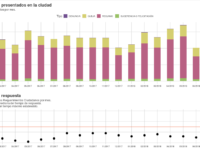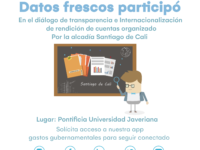MEData is the strategy for providing, appropriating and using the public data of Medellin. It will become the official information source of the city, where citizens will have constant and reliable data that can be used to generate knowledge, promote technological innovation and boost economy. it is the first government platform that integrates strategic information sources into a big data technology and automatically synchronizes them with an open data portal.
Case Studies
Innovations:
0
This website, as well as any data and map included herein, are without prejudice to the status of or sovereignty over any territory, to the delimitation of international frontiers and boundaries and to the name of any territory, city or area.
The promotion of competition has been identified as one of the major challenges of the Public Procurement System in Colombia. Despite its importance, it was only in 2019 that a tool allowing to effectively monitor the participation of the interested parties on the bidding processes was developed and implemented by the Colombian Procurement Agency. Thanks to this tool, participants are able to diagnose flaws, and make suggestions or requests for improvements.
A new waste management system, driven by information. Bogota has evolved its cleaning and recycling scheme, generating a profound transformation in the way in which citizens needs are met and garbage collection is managed. This model is based on the effective use of data and information. This initiative has allowed greater transparency in the actions of involved public and private organizations, an intense collaboration to provide the best service and enabling citizens active participation.
Bogota’s Citizen Complaints Dashboard (Tablero Control Ciudadano) is a preventive and social control web tool that displays the requirements that the citizens put before the public offices. The Citizen Complaints Dashboard gives access to public officials and citizens to the analysis and monitoring of complaints, claims and compliments entered into the System.
The Citizen Complaints Dashboard highlights alerting data related to issues regarding time of attention to the requirements as well as…
Case Study
Citizen control strategy through the Economic Transparency Portal of the Ministry of Finance y…

The Government of Colombia has developed the Economic Transparency Portal, www.pte.gov.co, a web-based initiative to make visible to the citizens the national and regional public budgets and all public contracting. A strategy was designed with the objective of inviting citizens to carry out social control and oversight of public resources based on the data published on the Portal. Hackathons, rallies and other contests have been held in 2018 in order to achieve feedback and public participation.
The Colombian Public Innovation Team ran a trial aimed to improve the quality and quantity of food served in the Colombian government’s school meals programme (PAE). It combined SMS messages to encourage parental engagement in the programme and lighter audits by a third party (local university students). Behavioural insights were applied to inform message design. The project included a learning phase to test and adapt elements of the intervention and an experimental evaluation (RCT) in the…
Our innovation is a platform that takes data from different open data government sources, and proposes a way to use analysis, visualization, models, predictions for citizens, thereby linking data literacy processes with innovation.
In a context where the channels between institutions and citizens have been broken by corruption, Día Blanco [White Day] is developed to promote bonds of trust and legitimacy among communities. In the last 3 years, more than 35,000 citizens have been mobilized by this innovative experience, which helps social organizations to inform their communities about their management and impact on local development through social accountability exercises.





